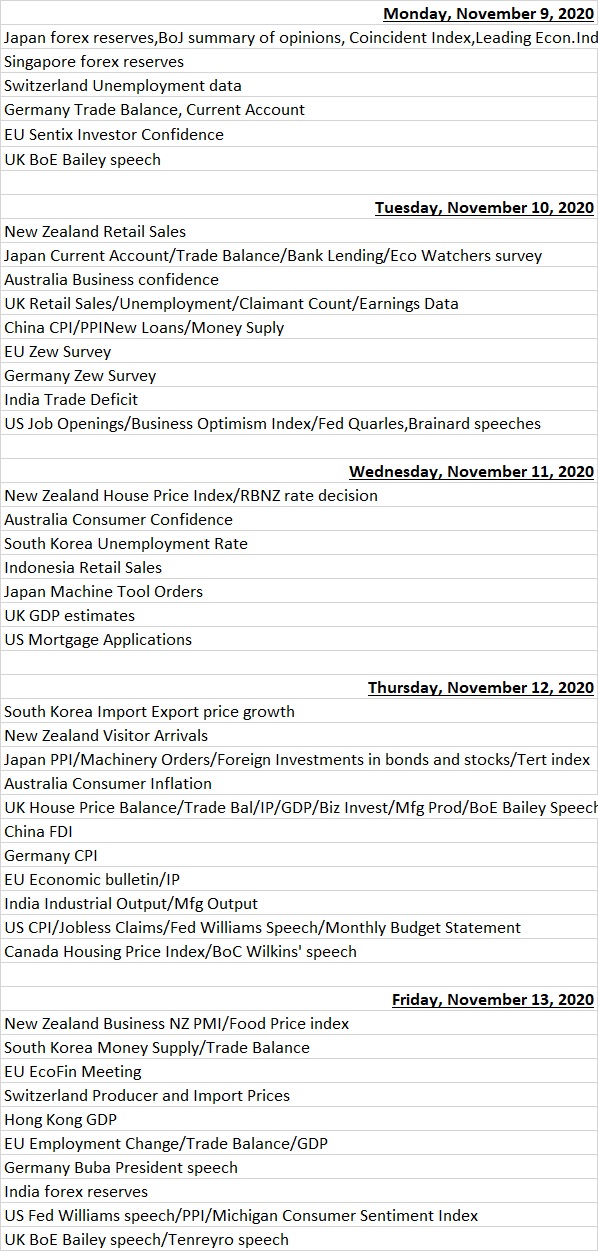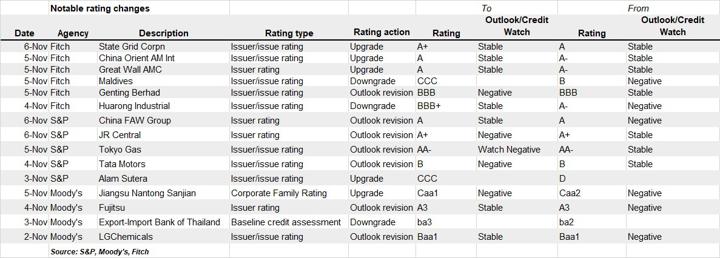Economic events
Emerging market assets will get a lift from President Elect Joe Biden’s win in the US elections but trading will remain volatile in the weeks ahead as President Donald Trump tweeted pressing his claims of voter fraud. The rally could also be capped by the reduced chance of massive fiscal stimulus due to a policy gridlock in a divided US government and in Asia by key data releases in China and India.
“Joe Biden has won the contest for the White House – an outcome that signifies a return to a near-term market environment dominated by low rates, a hunt for yield and growth stocks,” said BlackRock analysts in a note. “Risks to the outcome appear remote, and we prefer to look through any market volatility that legal challenges by President Trump may bring. A divided government would constrain the Biden administration’s ability to implement plans for large-scale fiscal stimulus and public investment, tax, healthcare and climate related legislation.”
The declaration of Pennsylvania as a Biden win gave him more than the 270 electoral college votes required to take him to the White House making Trump only the third US President in the past half a century to serve just a single term.
“President-elect Joe Biden will deliver a boost to global stock markets and the US and world economy,” said Nigel Green, chief executive and founder of deVere Group. “Even possible legal challenges from Trump will be dismissed by investors who will instead be focusing on the renewed certainty and stability that a Biden White House will bring, including in key areas such as trade tensions with China, keeping the US in the World Health Organization, resigning the Paris climate agreement and abiding by other international agreements and long-standing international allies.”
He said sectors that will benefit from the Biden administration’s agenda include renewable energy, industrials and infrastructure, and small caps.
“The world is looking at America, it needs to lead the world economy in a positive, forward-thinking and smart way – and at pace. If it doesn’t, we can expect American economic dominance to ultimately be replaced by an emerging and fast-growing Asia,” Green said.
The economic data calendar in Asia Pacific is equally crucial with many Asian economies set to release third-quarter GDP data in the week ahead. Malaysia, the Philippines, Hong Kong and Japan are all reporting, but the greater focus will be on forward looking views, after better-than-expected PMI data.
China’s official October statistics could confirm a sustained economic recovery after Caixin China PMI data indicated a solid start for output in the fourth quarter, backed up by the fastest upturn in overall sales for nearly a decade.
“As such, new yuan loans and total social financing will provide updates on credit growth and therefore the extent to which any stimulus measures will remain in progress to support the Chinese economy. Data on foreign direct investment and inflation will also be updated,” said Bernard Aw Principal Economist, IHS Markit.
Fund flow
The week before the US elections saw investment flows following the same pattern reflecting expectations of a Democrat win although the momentum slowed as doubts emerged about the ability of the Democrats to wrest the Senate from Republicans.
Cameron Brandt, Director of Research at funds flow data provider EPFR said that in the week ending November 4 “both emerging markets equity and bond funds posted inflows, funds with socially responsible (SRI) or environmental, social and governance (ESG) mandates attracted fresh money, equity investors showed a preference for diversified and Asian exposure, fixed-income investors continued to worry about inflation and US Money Market Funds posted their 12th outflow in the past three months”.
Brandt said that with swathes of Europe being locked down to contain a surge in COVID-19 cases and the electoral uncertainty stalking the US, investors with a developed market focus also showed a preference for diversified or Asian exposure during that week.
EMEA Equity Funds were the only one of the four major regional groups to post an outflow and Emerging Markets Equity Funds saw their seventh straight inflow pushed up by retail participation climbing to an 11-week high.
On the fixed income side, emerging markets bond funds recorded their 17th inflow in the past 18 weeks and funds with sovereign debt mandates attracted more than twice the new money compared with investment grade corporate debt funds. China bond funds were once again by far the biggest money magnets on a country-wide basis.
All this was benefited by outflows from US money market funds, which saw $18.7 billion in redemptions.
Economic Data Calendar

Last Week’s Ratings Chnages























